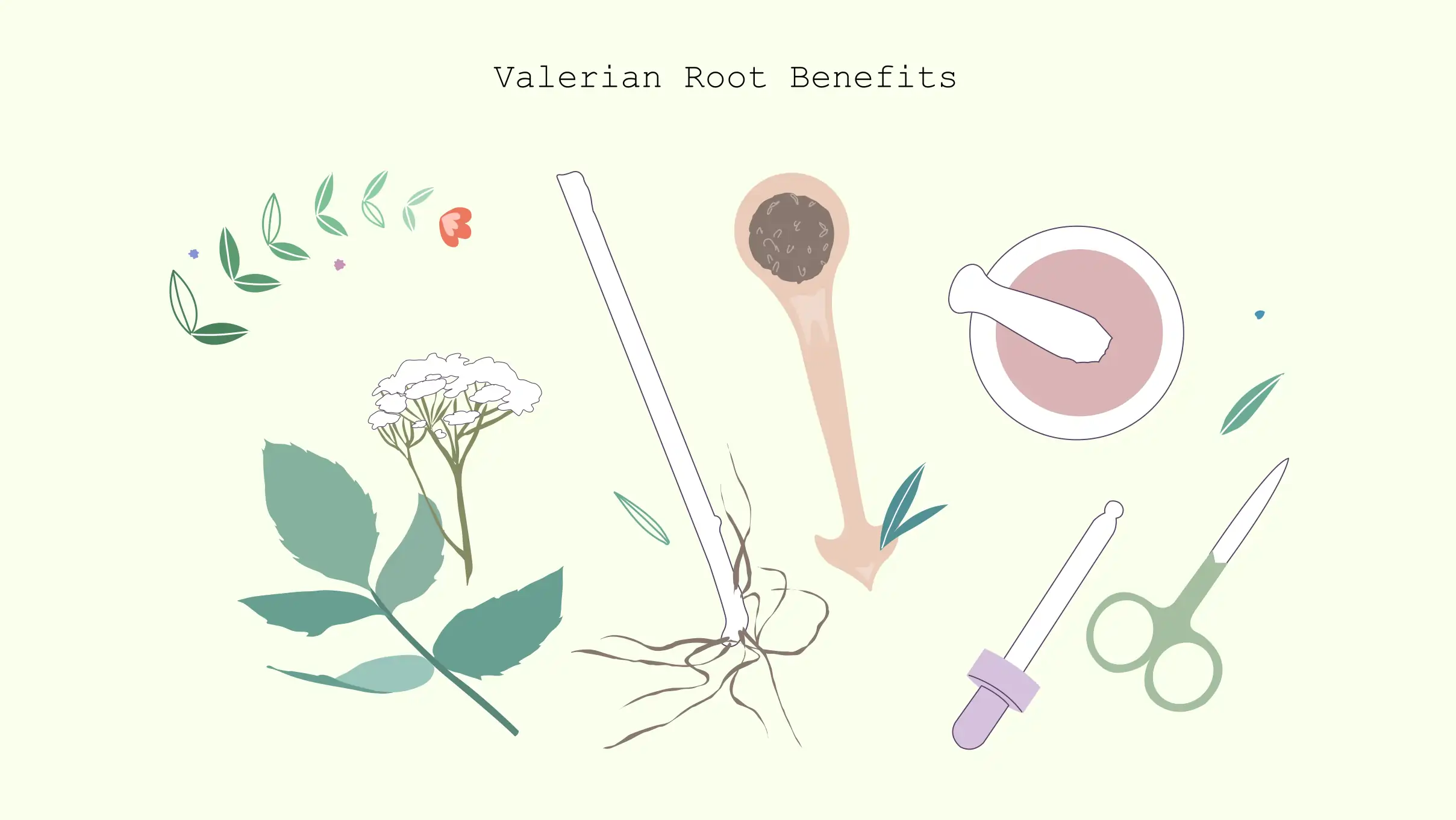Valerian Root: Benefits, Side Effects, Dosage
Written by


Even with all the manufactured medicines and prescriptions at our fingertips today, people are turning to medicinal plants worldwide. These herbal remedies are traditional medicines that can heal and boost physical and mental well-being.
And this article is about a particular herbal supplement: Valerian root. This herbal remedy is known to treat many health concerns like insomnia, anxiety, and others. It has been used for over 1000 years as a sleep aid for its calming properties.
But there’s more to valerian root than meets the eye. So scroll down to uncover everything you need to know about valerian, including what is valerian root, valerian root benefits, its side effects, and the safe amount of dosages.
What Is Valerian Root
Valerian is a flowering herb native to Europe and Asia. It now grows wild in many other areas of the world. The plant bears sweetly scented pink or white flowers that attract many fly species, and the root is considered a herbal remedy for insomnia, anxiety, and other health concerns.
Furthermore, valerian roots are used to make dietary supplements such as capsules and tablets, as well as teas and tinctures. They are popular natural sleep aids and are easily available in herbal stores and online.
In addition, it is believed the valerian root has been used for therapeutic purposes. And unlike the scented flowers, valerian roots have a strong odour that many people find unpleasant.
How Does Valerian Affect the Body
It is believed that valerian root benefit uses can treat a variety of health conditions. The evidence supporting valerian root health benefits is generally mixed, and scientists aren’t sure how valerian works in the body. However, a fact study suggests that chemical constituents of valerian have been identified, which may be responsible for its sleep-promoting or calming effects.
Compounds in valerian, called valerenic acid and valerenol, can act on GABA (Gamma-aminobutyric acid) receptors in the brain. GABA is an amino acid that helps regulate nerve impulses in the nervous system.
The above-mentioned valerian compounds modulate GABA and interact with specific receptors for serotonin and adenosine, chemicals that are involved with the regulation of sleep and mood.
Valerian Root’s Health Benefits

It is believed that valerian root can treat a variety of health conditions. So, here are some of the valerian root health benefits.
Insomnia
Valerian root for sleep is one of the four identified herbal treatments. Despite the little evidence, the valerian herb is commonly known to improve sleep quality.
Furthermore, a 2020 review, the analysis that included 60 studies, re-evaluated the effectiveness of valerian root benefit used to improve subjective sleep quality. It concluded that valerian could be a safe and effective treatment to promote sleep and prevent associated disorders such as insomnia.
Anxiety
Valerian root for anxiety is touted by some as a safe and natural alternative to prescription anxiety drugs such as Amobarbital, Buspirone (Anxipar), Chlordiazepoxide (Anxizide) and many more.
Without the pronounced sedative effect, valerian enhances GABA transmission. And according to research in 2021, valerian improved anxiety and depression in hemodialysis patients.
Hot Flashes
A hot flash is among the most common complaints of menopausal women. According to a 2013 study, the valerian herb can effectively treat menopausal hot flashes. During this study, 68 menopausing women were prescribed 255 mg Valerian capsules 3 times a day for 8 weeks.
Valerian is a phytoestrogen that contains volatile oils, including monoterpenes, sesquiterpenes and valepotriates, which alleviate menopause symptoms.
Other Potential Benefits of Valerian Root
Besides the above-mentioned benefits, other benefits of valerian root are:
Menopausal Symptoms
Common symptoms of menopause include hot flashes and vaginal dryness. Valerian root benefit uses include the reduction of hot flashes among women who are reluctant to receive hormone therapy.
Menstrual Issues
Premenstrual syndrome (PMS) is one of the most common difficulties in women before their menstrual cycle. The most common symptoms include cramps, bloating, fatigue, irritability, flatulence, breast tenderness, mood changes, depression, and anxiety disorders.
Although the exact cause of this syndrome has not been correctly diagnosed, according to a 2016 research study, valerian root extract could reduce the severity of the symptoms of premenstrual syndrome.
Restless Legs Syndrome
Restless leg syndrome (RLS) is a condition characterised as an irresistible urge to move the legs while sitting or lying down, typically in the evenings. Valerian may be an alternative treatment for the symptom management of RLS. And the results of a 2009 study suggest that using 800 mg of valerian for 8 weeks improves symptoms of RLS and decreases daytime sleepiness.
Valerian Root Side Effects
Most studies did not describe the process of identifying, recording or analysing the drawback of valerian root. However, the 2020 review analysis of the study on ‘Valerian Root in Treating Sleep Problems and Associated Disorders’ reported that participants experienced specific adverse effects.
And though valerian root side effects are rare, some people may experience the following symptoms.
- Headache
- Dizziness
- Itchiness
- Upset stomach and stomach aches
- Metallic taste or dryness in the mouth
- Vivid dreams
- Daytime drowsiness and fatigue
Moreover, the side effects of valerian root on a person may depend on the dosage taken.
How to Take Valerian Root
Valerian supplements are available in the form of pills, extracts, tinctures, and as dried herbs. And to enjoy the valerian root benefits, take the supplements as per instructions from healthcare providers. Furthermore, starting with a low dose when taking a supplement is often best.
Most capsules and pills are formulated in doses ranging from 300 to 600 milligrams. However, making a tea of valerian root is equally beneficial and might be one of the best tea for sleep.
Ensure to add the right amount to the tea. Add 2-3g of valerian root if using dried roots; when using tinctures and extracts, check the recommended dosage on the product label since they may vary in concentration.
When to Talk to Your Doctor
Since there are no official guidelines regarding natural sleep aids, it is better to speak to your doctor first. Doctors can advise on potential risks, side effects, and a recommended dosage based on your symptoms.
One particular dose may not be appropriate or effective for everyone, even with the same ailments; hence make an appointment with your doctor to receive proper treatment.
Final Words
Although research is limited on the valerian root benefits, the existing evidence suggests that valerian supplements may help improve sleep, reduce anxiety, and improve symptoms related to OCD, menopause, and PMS.
Valerian roots are relatively safe and unlikely to cause serious side effects, but they aren’t safe or appropriate for everyone. So it is better to speak with a healthcare professional before consuming it.
FAQs
Can I take valerian root every day?
Up to six weeks of daily consumption of 300–600 mg of valerian has proven to be safe. The safety of using it in the long term is unknown.
What are the dangers of valerian?
Dizziness, drowsiness, headaches, stomach upset, mental dullness, and vivid dreams are a few of the more typical side effects.
What does valerian root make you feel?
According to research, valerian root supplementation may speed up the process of falling asleep and enhance both the quality and quantity of sleep. According to a review from 2020 that looked at 60 studies, valerian root may be a secure and reliable way to ward off sleep-related disorders.
What does valerian do to the brain?
Although scientists don’t completely understand the working of valerian, they think it does so by raising the brain’s concentration of the chemical gamma-aminobutyric acid (GABA). GABA has a calming effect on anxiety and aids in regulating nerve cells.
people like this article
Written by








